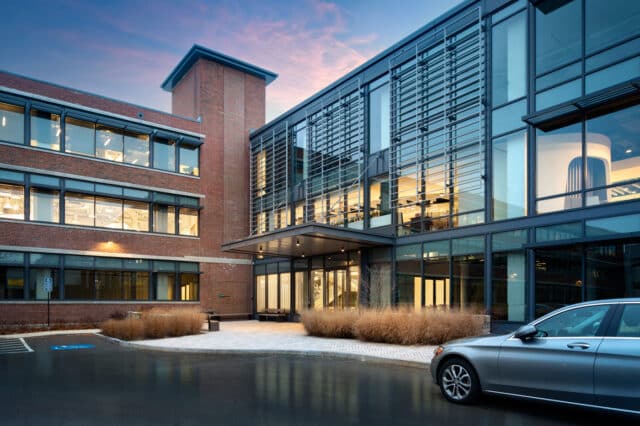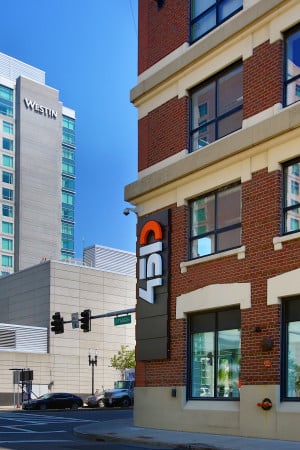Commercial landlords trying to capture soaring demand from rapidly growing life science startups are increasingly building out lab space on spec in the hopes of catalyzing the next life science cluster outside of East Cambridge.
The spec suite movement allows the tenant to avoid paying potential multi-million-dollar fit–out costs upfront, while spreading slightly higher rents over the duration of the lease. Companies can spend more of their funding on scientist salaries, rather than real estate, as they conduct clinical trials and pursue FDA approvals.
And landlords can make back their investment in building upgrades by luring life science companies that pay higher rents than office tenants, even attaining higher rents than comparable lab space in exchange for the ability to help a tenant expand their operations in weeks, not months when a wave of venture capital funding rolls in.
“They are selectively building out spaces on a spec basis ranging from 3,000 to 30,000 square feet and everything in between,” said Eric Smith, a senior vice president for CBRE in Boston. “They’ve invested significant capital to accelerate the speed at which they can deliver space to companies, and they can be up and running in 30 to 90 days.”
On the Hunt for 5M SF
Developers including BioMed Realty, Related Beal and King Street Properties are all testing the demand for spec lab suites at properties in Boston and the suburbs. Life science companies are in the market for 5 million square feet of office-lab space in Greater Boston, according to Colliers International, with nearly two-thirds of the demand coming from early-stage companies.
“If you bring plug-and-play space and get a tenant into lab space in a third of the time it would take for a typical lease and build, that’s going to be a huge advantage,” said Evan Gallagher, executive vice president at Colliers in Boston. “You can avoid capital costs for a tenant in an early-stage company where cash is king.”

Following an office-to-lab conversion, BioMed Realty is marketing prebuilt lab suites at 65 Grove in Watertown, originally built in 1945, and recently signed a lease with Cambridge-based Roothpath Genomics. Photo courtesy of BioMed Realty
Lab tenant fit–outs in union labor markets such as Boston and Cambridge can cost up to $275 per square foot, said Tyson Reynoso, a senior director at Boston-based life science developer King Street Properties. If the property was originally built as traditional office space, costs can top $400 per square foot.
In a traditional lease, and in tight lab markets such as East Cambridge, tenants are usually responsible for paying those costs up–front. By doing the work themselves on spec, landlords get more of a say over the designs to ensure they’re suitable for subsequent tenants.
“We get to completely control the design of that space, so it allows us to provide space that’s super flexible,” said Sal Zinno, vice president of development for BioMed Realty, “And if the tenant outgrows it, we can successfully re-lease it with minimal capital cost.”
Brokerage Avison Young is tracking at least five lab conversions of Waltham office buildings, with all of the developers planning to offer turnkey lab space.
“It’s clear that landlords know there is a pinch in lab supply, and so now they are casting a wide net similar to the dotcom era on the [Route] 128 belt,” said Tucker White, senior research analyst for Avison Young, noting that the spec suite supply is concentrated in emerging lab clusters including Watertown, Somerville and the Boston Seaport District.
Another new player seeking to expand its presence in Greater Boston is Phase 3 Realty Partners, a San Diego-based developer that acquired a 61,788-square-foot office building at 1560 Trapelo Road in Waltham last month for $22.85 million and plans a spec suite lab conversion.
A Leap of Faith in Unproven Locations
Despite the highly specialized nature of life science space, developers can cast a broad net by building out biosafety lab 2-rated space, a designation by the Centers for Disease Control and Prevention assigned to labs that provide containment for agents with moderate health risks. About 85 percent of lab tenants in Greater Boston are seeking such space, Gallagher said.
Biotech startups typically seek a 50-50 mix of office and lab space, with flexible, biology-based lab components as opposed to chemistry lab space that requires fume hoods, additional power and ventilation equipment, said Mark Winters, a vice chairman at Newmark Knight Frank in Boston.

Developer Related Beal and has attracted 22,000 square feet in lab leases to 451 D St., a vintage building it’s updating in Boston’s Fort Point neighborhood. Photo courtesy of Related Beal.
“We’re starting to see it in some locations where [landlords] are trying to generate activity and prove that it’s a lab location,” Winters said. “They’re trying to make it easy for tenants after they’ve raised venture capital funding, and the sooner they can move into the space the better.”
And by assuming the costs of installing base lab infrastructure, landlords can reposition aging office buildings in submarkets that are losing ground to downtown competitors.
One of the biggest Kendall Square landlords, BioMed Realty, is offering spec suites at its 65 Grove property in Watertown, which it acquired in 2018 for $62.5 million following an industrial-to-office conversion by Boston-based Cresset Group.
“The number one thing that [life science] CEOs are looking to do is hire talent,” said Colleen O’Connor, vice president of leasing for BioMed Realty. “They don’t necessarily have the funds or the expertise to build out this space. We know we can deliver the space that will work for these tenants.”
RootPath Genomics will relocate from a Cambridgeport incubator to 4,000 square feet at the World War II-era 65 Grove this spring, O’Connor said, following BioMed’s conversion of the Watertown building to lab-ready space. RootPath raised $11 million in series A venture funding in January.
Another 7,000 square foot spec suite is available on the ground floor.
New Seaport Owner Has Life Science Strategy
The recent entry of Hong Kong investor Nan Fung into the Greater Boston life science market is being watched closely by the local real estate industry. The developer established a life science real estate subsidiary last fall in Boston and named former JLL executive Matthew Powers to pursue acquisitions, kicking off with this month’s $115 million purchase of 51 Sleeper St. in Boston’s Fort Point.
Nan Fung has already secured a letter of intent to lease 80,000 square feet from an East Cambridge life science company, according to a presentation at Colliers Boston’ 2020 Outlook forum on Jan. 29.
A commercial real estate source said Cambridge-based rare disease specialist Avrobio, which raised $129.5 million in an equity offering last July, is the potential tenant. Colliers and Nan Fung declined to comment.

Steve Adams
Another vintage Fort Point office building, 451 D St., is being updated by developer Related Beal and has attracted 22,000 square feet in lab leases.
Another new player seeking to expand its presence in Greater Boston is Phase 3 Real Estate Partners, a San Diego-based developer that acquired a 61,788-square-foot office building at 1560 Trapelo Road in Waltham last month for $22.85 million and plans a spec suite lab strategy.
The proliferation of landlords specializing in life science space – Colliers is tracking more than 50 investors and developers in Greater Boston, up from 12 just two years ago – points to the need to employ spec suites as a competitive advantage, Gallagher said.
“There’s going to be a group of very experienced landlords who are willing to take a lot of risk and understand what these companies need and come up with a creative approach,” he said.






